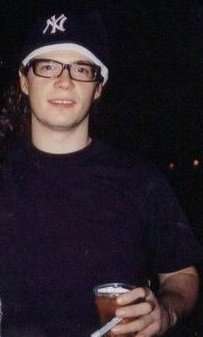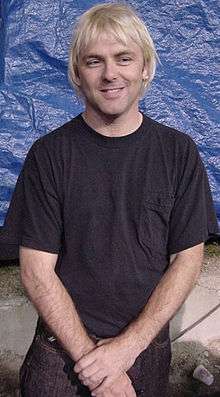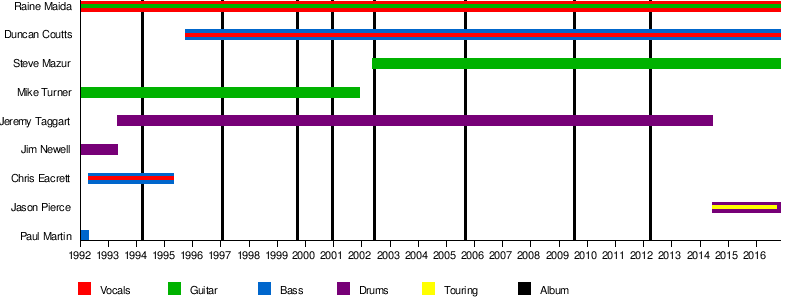Our Lady Peace
| Our Lady Peace | |
|---|---|
 Our Lady Peace in the studio in 2016. From left to right: Duncan Coutts, Jason Pierce, Steve Mazur, and Raine Maida | |
| Background information | |
| Origin | Toronto, Ontario, Canada |
| Genres | |
| Years active | 1992–present |
| Labels | |
| Associated acts | Crash Karma, Fair Ground |
| Website |
ourladypeace |
| Members |
|
| Past members |
|
Our Lady Peace (sometimes shortened to OLP)[1][2] is a Canadian rock band formed in Toronto, Ontario, in 1992.[3] Headed by lead vocalist Raine Maida since its formation, the band additionally consists of Duncan Coutts on bass, Steve Mazur as lead guitarist, and Jason Pierce on drums. The band has sold millions of albums worldwide,[4] won four Juno Awards, and won ten MuchMusic Video Awards — the most MMVAs ever awarded to any artist or group.[5] Our Lady Peace are one of Canada's most popular bands and are also one of the few Canadian rock acts that managed to achieve success in both the 90s and 2000s.[6]
They have released eight studio albums, one live album, and two compilation albums to date, with their 1997 album Clumsy often being considered their signature and most widely recognized work.[7] Our Lady Peace enjoyed many hit singles, ranging from "Starseed" in 1994, to "Somewhere Out There" in 2002.
The band's earlier albums are often praised for their unique sound and style, with lead singer Maida being called "erratic" and "truly unrivaled"[8] as a vocalist. Their fifth album, Gravity (2002), is sometimes noted to have been a "radical departure"[9] from this distinctive style. Lead singer Maida has confirmed the difference, calling Gravity "vastly different" from their previous records.[10] The coincidental 2002 departures of both co-founding member Mike Turner and longtime-producer Arnold Lanni, in combination with influence from then-new producer Bob Rock are sometimes credited as main factors in the style evolution.
History
Formative years (1991–1993)

In late 1991, guitarist Mike Turner placed an ad in Toronto-based Now newspaper in search of musicians. Michael Maida, a criminology student at the University of Toronto,[11] was the first to reply. The two formed a band called As If, inviting Jim Newell as drummer and a friend of Turner's, Paul Martin, to play bass. After they played a number of gigs in Oshawa with sets containing a mix of original and cover material, Martin departed soon after, and the band placed an ad for a replacement bassist. Chris Eacrett, a business student at Ryerson University, replied and was accepted after an audition. During that time, Turner and Maida attended a music seminar where they met songwriter and producer Arnold Lanni, the owner of Arnyard Studios. The band, with Lanni, commenced writing new material and recorded some material under the As If name.
Soon thereafter, the band's name was changed to Our Lady Peace, after a Mark Van Doren poem of the same name. With encouragement from their producer Lanni and his management team, the band performed some gigs in Eastern Ontario and Montreal in conjunction with The Tea Party. It was during this time that Maida began using the stage name "Raine" instead of "Mike" to reduce confusion about having two Mikes in the band. He has used this name professionally ever since, legally adding it, even with Mike Turner having left the band.

An independent music video of the band's debut song "Out of Here" was created in February 1992 by Sam Siciliano, a film student and friend of Turner's, who produced, edited, and directed the video. The video was aired on MuchMusic on their Indie show. After returning to Arnyard Studios to continue writing and recording material, drummer Jim Newell departed the band. Writing and recording continued with session drummer John Bouvette.
With managers Rob Lanni and Eric Lawrence of Coalition Entertainment representing the band, short showcases were arranged with Warner Music Canada, EMI Canada, and Sony Music Canada. Sony Music Canada head of A&R Richard Zuckerman liked what he heard, and saw the potential of the band, its producer, and management. The band signed a record and publishing deal with Sony Music Canada in April 1993, and commenced writing for their debut album. Around the same time, then-17-year-old Jeremy Taggart joined the band as permanent drummer.
Early success (1994–2000)
After writing and recording over the next year or so, OLP released its debut album, Naveed, in March 1994 through Sony Music Canada. Following the release of the album, the band toured Canada, supporting acts I Mother Earth and 54-40. Naveed was later picked up and released in the United States in March 1995 by a Sony Music indie label, Relativity Records, after which the band toured as the opening act for Van Halen's Balance summer tour and opened shows for Page & Plant. Touring of the album resumed in 1996 with time spent touring with Canadian artist Alanis Morissette. The title track of the album, "Naveed", became a hit in Canada, while "Starseed" also charted in the United States. "Starseed" would later be added on the Armageddon film soundtrack.
In early 1997, Our Lady Peace was offered and accepted an American signing with Columbia Records, expanding their horizons within Sony Music. After touring the album Naveed, the band began work on their second studio album. As the writing process ensued, bassist Chris Eacrett left the band due to musical differences. Duncan Coutts, a Ridley College alumnus and former classmate of Raine Maida, joined the band as bassist during the recording of OLP's second album. Duncan Coutts and Mike Turner both studied at the University of Western Ontario and lived in Saugeen–Maitland Hall.
 |
|
| Problems playing this file? See media help. | |
Our Lady Peace's second album, Clumsy, was released in January 1997. Album singles "Superman's Dead" and "Clumsy" found immense success especially in Canada. Clumsy established Our Lady Peace as a leading band in the Canadian rock scene. The album cover is based on an abandoned song called "Trapeze", which was initially intended to be the title of the album. In February 2001, Clumsy became a diamond-certified album in Canada. After Clumsy's release, the band founded the Summersault festival that toured across Canada in 1998 and again in 2000, with lineups that included the Foo Fighters, A Perfect Circle and The Smashing Pumpkins.
In 1999 the band released their third album titled Happiness... Is Not a Fish That You Can Catch. The album included such hits as "Thief", a song about a young girl named Mina Kim that the band met who had cancer, as well as "One Man Army" and "Is Anybody Home?". Legendary jazz drummer Elvin Jones was featured on the song "Stealing Babies". Multi-instrumentalist Jamie Edwards was brought in 1996 for the sessions for the album and remained an unofficial member of the band until 2001 when he was asked to officially join the band to finish the album Gravity. Shortly after the completion of the record, Jamie chose to leave the band, returning briefly to stand in for Mike Eisenstein during the Canadian tour of Gravity. The band also played an eleven song set at Woodstock 1999.

In 2000, the band released Spiritual Machines, a concept album inspired by Ray Kurzweil's book The Age of Spiritual Machines. During the recording of the album, drummer Jeremy Taggart was sidelined with an ankle injury; Matt Cameron, Pearl Jam's drummer and then-former member of Soundgarden, played drums on "Right Behind You (Mafia)" and "Are You Sad?" in his place. The album featured the singles "In Repair", "Life" and "Right Behind You (Mafia)". "Life" was also featured in the soundtrack for the Canadian sports comedy film Men with Brooms. Spiritual Machines was less commercially successful than its predecessors.
Line-up and stylistic changes (2001–2005)
By the early 2000s, the band was becoming restless, feeling a "numbness" with their popularity as well as the "over-saturation" of their songs on Canadian radio, which resulted in them almost breaking up after completing their Spiritual Machines tour.[13][14]
In December 2001, having dropped original producer Arnold Lanni, the band met with new producer Bob Rock to start work on their fifth album. Later the following month, founding guitarist Mike Turner either quit the band[15][16][17] or was forced out due to the other members' concerns about his guitar-playing abilities.[18] Said Maida of Turner's departure, "The last two records we've been yearning for a guitar player that can really stand up and have a strong voice and Mike (Turner) just wasn't that kind of guitar player."[14] Turner later formed the band Fair Ground with Harem Scarem guitarist Pete Lesperance and later joined the band Crash Karma. Turner's last performance with the band was for Music Without Borders at Toronto's Air Canada Centre on October 21, 2001.[19] In the months following Turner's departure, the band held auditions for a replacement lead guitarist. Steve Mazur, a friend of a friend of drummer Jeremy Taggart, was announced as the new guitarist in April 2002. Long-time touring musician Jamie Edwards also became an official band member around this time, but later left that year for personal reasons.
In the following few months their fifth album, Gravity, was completed and released.[20] The album received mixed reviews, with some critics and fans contending that the album was a significant departure from the band's original musical style, adopting a more mainstream sound and lacking any creativity.[21] Maida's signature nasal falsetto vocal technique was also absent from the album.[21] Maida said that the album was "pretty much the opposite of Spiritual Machines", calling it their "most basic album" since Naveed.[13] Gravity's chart-topping first single, "Somewhere Out There", became the band's biggest international hit to date, while the second single, "Innocent", was also very popular and regained popularity in 2008 after a cover performance on American Idol. Gravity proved to be more successful than Spiritual Machines in both America and Canada, due to the hit singles of both "Somewhere Out There" and "Innocent". In between their fifth and sixth albums, OLP released their first live album, titled simply Live, which contains a selection of the band's hits from their first five albums as played throughout tours in various Canadian cities.
In August 2005, the band released their sixth album Healthy in Paranoid Times, which included the tracks "Angels/Losing/Sleep", "Will the Future Blame Us", and "Where Are You?" Shortly after recording the album, the band disclosed that during the making of the album, they nearly broke up.[4] According to Rolling Stone, it took 1165 days to create it, and its twelve tracks were chosen from forty-five that the band had written and produced. Maida has since criticized Healthy in Paranoid Times, saying that "(the) record was total excess, total bullshit in the sense of, we finally had succumbed to a label: making us record that many songs, trying to find the right singles for American radio and MTV."[22]
After nearly breaking up during the recording of Healthy in Paranoid Times[4] the band took a prolonged hiatus before releasing their seventh album, Burn Burn, in July 2009.[23][24] In 2010, the band completed a North American tour featuring both their 1997 album Clumsy and their 2000 album Spiritual Machines in entirety,[25] and also began work on their eighth album, Curve, which was released on April 3, 2012.[26][27][28][29] Curve's first single, "Heavyweight", was released in advance of the album on December 20, 2011.[30]
Compilations, hiatus, and Burn Burn (2006–2009)
In November 2006, Columbia Records released a greatest hits compilation titled A Decade following the band's departure from the label. There were two previously unreleased songs on the album, "Kiss on the Mouth" and "Better Than Here". Steve Mazur wrote in a blog on the band's fan club that the new songs on the disc were two unreleased songs from the Healthy in Paranoid Times sessions. The collection also included a bonus DVD containing live concert footage and exclusive interviews at the Massey Hall concert. The single "Kiss on the Mouth", the first off A Decade, has received play on radio stations across Canada.
On March 31, 2009, Legacy Recordings released OLP's second compilation album, The Very Best of Our Lady Peace as part of the Playlist series.[31] The album includes famed singles such as "Naveed" and "Somewhere Out There", as well as lesser-known songs such as "Car Crash" and "Stealing Babies".[31]
After the release of their 2006 compilation album, A Decade, the band entered a short hiatus period after having parted ways with Columbia Records. Lead vocalist Raine Maida began work on his first solo album, The Hunters Lullaby, which was released in 2007, while the remaining members of the band also became preoccupied with other personal endeavours. The hiatus would result in the longest time gap between OLP studio albums to date.
The band began working on Burn Burn, their seventh studio album, in February 2007, completing it in March 2009. Raine Maida called the new album "huge", and noted it as being a "proper rock album again"—featuring a return to the raw originality of the band's first album Naveed, though a "little more mature".[32] Maida solely produced the album, noting his excitement over "not (having had) anybody intrude on (recording) sessions".[32] The album was released in North America on July 21, 2009 to mixed reviews and later receiving Gold status in Canada.[23] The band toured to promote Burn Burn and made stops in several cities across North America from July through December 2009.[33]

Recreation tour and Curve (2010–2012)
In December 2009, the band announced that they would be "recreating"[25] both their 1997 album Clumsy and their 2000 album Spiritual Machines by performing them live in their entireties[25][34] throughout a new tour that ran from March–May 2010.[25] The tour spanned Canada and select U.S. cities.[25]
Our Lady Peace's eighth studio album, Curve, began production in January 2010 and was released April 3, 2012.[25][26][27][35] The album's first single, "Heavyweight", was released on December 20, 2011. In a March 2010 interview, lead singer Raine Maida noted that after having gone back to re-learn songs from Spiritual Machines and Clumsy in preparation for their tour, he was "brought back to the great things about this band". He added that fans — especially those who are particularly fond of the pre-Gravity albums — should expect to see "a lot of stuff (from pre-Gravity albums) creeping its way back into our music".[10]
In 2012, the band released a song titled "Fight the Good Fight" in reaction to the Occupy Wall Street events that took place across North America in late 2011. This track appears on the Occupy This Album compilation box set.
Taggart's departure and ninth studio album (2014–present)
A planned tour to celebrate the 20th anniversary of Naveed was cancelled in early 2014 due to "scheduling conflicts". In June 2014, speculation began that longtime drummer Jeremy Taggart was no longer part of the band, which was confirmed in statements by both Taggart and Our Lady Peace on June 30, 2014.[36] Canadian drummer Jason Pierce (ex-touring drummer for Paramore and current touring drummer for Treble Charger) is currently filling in during live shows, while Jason Boesel of Rilo Kiley is handling recording duties.[37] An official replacement has not yet been announced.
On April 30, 2014, Raine Maida revealed on his Twitter account that OLP was headed back into the studio with producer Mike Elizondo, in Los Angeles.[38] On July 10, 2014, the band débuted their single, Won't Turn Back, on Toronto's 102.1 The Edge radio station. On July 17, "Won't Turn Back" was released on iTunes in Canada.[39] Maida described the song as "poppier" than much of their discography.[40]
On November 20, the band tweeted that it would be releasing unreleased songs and b-side tracks via email subscription. The first song from the "OLP Vault" was "No Warning". It was released on November 27. A second, a demo of "Not Afraid" was released on December 11. A live cover of Lana Del Rey's "Summertime Sadness" was released on December 24. On January 15, a demo version of Consequence of Laughing, named "Immune" was released from the vault. On January 28, "Hurt Yourself" was released (A track recorded during Healthy in Paranoid Times, and released alongside #BellLetsTalk to raise awareness for mental illness). On February 14, the band released a clip of the demo "Say". A full version of the song "Vampires" was released on March 2.
As of September 24, 2016, Jason Pierce is listed as the drummer in the members section of their Facebook page, although no official announcement has yet been made as to whether he is an official replacement for Jeremy Taggart. Pierce has served as a touring member since Taggart's departure in 2014.[41] The operator of the band's official Instagram account later insinuated his official membership.[42]
Tour
Musical style and themes
Our Lady Peace has been described as grunge,[43] post-grunge,[44] alternative rock[45] and hard rock.[46]
In the band's early years, especially in Naveed and Clumsy, their overall sound was often compared to alternative rock and grunge bands including Soundgarden, The Smashing Pumpkins, and Pearl Jam.[8] The band's melodic structure was also said to echo that of bands such as The Beatles and Led Zeppelin.[8] Lead singer Raine Maida's voice was called "erratic" and "truly unrivaled" in his field.[8] In albums Naveed through Spiritual Machines, Maida sang in a countertenor vocal register and was known for his frequent use of falsetto. This singing method, in combination with the band's melody structure, often gave many songs a surreal sound and effect.
The band's song "Whatever" was used as professional wrestler Chris Benoit's WWE theme song from 2002 to 2007. They had not performed the song live for a number of years prior to the murder/suicide of Benoit and his family in 2007. In a 2012 interview, they stated that they would never play the song live ever again due to the circumstances of Benoit's death.[47]
Discography
- Naveed (1994)
- Clumsy (1997)
- Happiness... Is Not a Fish That You Can Catch (1999)
- Spiritual Machines (2000)
- Gravity (2002)
- Healthy in Paranoid Times (2005)
- Burn Burn (2009)
- Curve (2012)
Band members
- Current members
- Raine Maida – lead vocals, acoustic guitar (1992–present)
- Duncan Coutts – bass guitar, backing vocals (1995–present)
- Steve Mazur – lead guitar, backing vocals (2002–present)
- Jason Pierce – drums, percussion (2016–present)
- Former members
- Jeremy Taggart – drums, percussion (1993–2014)
- Mike Turner – lead guitar, backing vocals (1992–2001)
- Chris Eacrett – bass guitar (1992–1995)
- Jim Newell – drums (1992–1993)
- Paul Martin – bass guitar (1992)
- Unofficial supporting members
- Jamie Edwards – guitar, keyboards (1999-2002)
- Mike Eisenstein – guitar, keyboards (2002-2003)
- Joel Shearer – guitar (2005-2006)
- Robin Hatch – keyboards (2012–2016)
- Jason Pierce – drums, percussion (2014–2016)
- Jason Boesel – drums on "Won't Turn Back" (2014)
- Timeline

References
- ↑ OLP – thefreedictionary.com – Farlex, Inc.. Retrieved February 17, 2010.
- ↑ OLP returns to its roots – Pique Publishing. Retrieved February 17, 2010.
- ↑ Our Lady Peace in the Pop Encyclopedia – Canoe.ca. Retrieved May 10, 2009.
- 1 2 3 "Our Lady Peace Get Well". Rolling Stone. August 1, 2005. Archived from the original on August 20, 2008. Retrieved July 17, 2008.
- ↑ "MuchMusic.com > MMVA06 > REWIND > 97, 98, 00". MuchMusic. Retrieved January 17, 2007.
- ↑ "Our Lady Peace - Biography - Amoeba Music". amoeba.com. Retrieved October 28, 2015.
- ↑ "Canada.com article top 100 Canadian albums". Retrieved on July 21, 2008. Archived October 22, 2007, at the Wayback Machine.
- 1 2 3 4 Our Lady Peace – Naveed review – Sputnikmusic.com. Retrieved May 10, 2009.
- ↑ "New OLP record a radical departure". Canoe. Retrieved July 17, 2008.
- 1 2 The complete Q&A: Raine Maida – Montreal Gazette. Canwest Publishing, Inc. 2010. Archived version retrieved December 15, 2011.
- ↑ "Biography". NME. Retrieved September 17, 2009.
- ↑ Our Lady Peace bandology – Ourladypeace.cc. Retrieved March 29, 2010.
- 1 2 Durham, Victoria. "Our Lady Peace – Weight and Bleed" Rock Sound Nov 2002. Retrieved September 21, 2009.
- 1 2 Pacienza, Angela. "Our Lady Peace Finds Gravity in Maui." The Winnipeg Free Press June 29, 2002: C6
- ↑ "Turner leaves Our Lady Peace citing creative differences" The Hamilton Spectator December 14, 2001: D07. Retrieved June 14, 2009.
- ↑ "The Torch article Our Lady Peace disappoints fans with new release". Retrieved on July 21, 2008.
- ↑ Anonymous. "Our Lady Peace puts out the call for new guitarist" Toronto Star February 19, 2002: A7. Retrieved June 14, 2009.
- ↑ Interview with Raine Maida – Bandzoogle. Retrieved March 31, 2010.
- ↑ ""New OLP album a radical departure: Our Lady Peace guitarist quits" – article at Jam! Canoe". Jam.canoe.ca. February 12, 2002. Retrieved October 29, 2011.
- ↑ Anonymous. "Our Lady Peace signs new guitarist" Toronto Star April 16, 2002: B8. Retrieved June 14, 2009.
- 1 2 Anon. "Our Lady Peace" – Kludge Sound June 26, 2002. Retrieved December 9, 2009.
- ↑ "interview with Raine Maida". Montreal Gazette. Retrieved July 17, 2008.
- 1 2 Our Lady Peace set to release their seventh studio album July 21 – Tradingmarkets.com. Retrieved May 5, 2009.
- ↑ "Our Lady Peace Launch Album With Exclusive Concert". idiomag. July 22, 2009. Retrieved July 24, 2009.
- 1 2 3 4 5 6 An Evening with Our Lady Peace — Ourladypeace.net. Retrieved December 7, 2009.
- 1 2 Our Lady Peace preparing new album — Chartattack.com. Retrieved on January 4, 2010.
- 1 2 Raine Maida Interview | Guitar International – Guitar International. October 22, 2010. Retrieved October 23, 2010.
- ↑ Steve Mazur – Twitter. Retrieved January 19, 2012.
- ↑ Raine Maida – Twitter. Retrieved January 19, 2012.
- ↑ "News: Our Lady Peace stream new track 'Heavyweight'". RocBloc. Retrieved April 18, 2012.
- 1 2 Amazon.com: Playlist: The Very Best of Our Lady Peace – Amazon.com. Retrieved March 27, 2009.
- 1 2 "interview with Raine Maida". Canoe. Retrieved July 17, 2008.
- ↑ Our Lady Peace rolls out a scorching summer tour – Consequence of Sound. Retrieved July 19, 2009.
- ↑ Raine Maida — Twitter.com. Retrieved December 7, 2009.
- ↑ Our Lady Peace: back from the brink. – Glacier Interactive Media. Retrieved February 17, 2010.
- ↑ "Our Lady Peace - It is with sadness that we say goodbye to... - Facebook". facebook.com. Retrieved October 25, 2015.
- 1 2 "Interview: Raine Maida Talks New Our Lady Peace Music, Taggart's Exit - Riffyou.com". Riffyou.com. Retrieved October 25, 2015.
- ↑ "raineanthonymaida". Twitter. Retrieved October 25, 2015.
- ↑ Schukov, Jenia (July 18, 2014). "Our Lady Peace Release Single "Won't Turn Back"". Confront. Retrieved August 2, 2014.
- ↑ Grant, Adam (July 21, 2014). "Interview: Raine Maida Talks New Our Lady Peace Music, Taggart's Exit". RiffYou. Retrieved August 2, 2014.
- ↑ https://www.facebook.com/ourladypeace/about/?entry_point=about_section_header&tab=page_info
- ↑ https://www.instagram.com/p/BKw0VeRjkLU/?taken-by=jasonpiercedrum
- ↑ "Naveed - EW.com". Entertainment Weekly's EW.com. Retrieved October 28, 2015.
- ↑ "Our Lady Peace". MTV Artists. Retrieved October 28, 2015.
- ↑ Steve McLean. "Our Lady Peace". The Canadian Encyclopedia. Retrieved October 28, 2015.
- ↑ MacKenzie Wilson. "Naveed". AllMusic. Retrieved October 28, 2015.
- ↑ Chattman, Jon (April 12, 2012). "Our Lady Peace Throws a Curve, Discusses the Late Chris Benoit". Huffington Post. Retrieved August 2, 2014.
- ↑ "ClumsyMonkey.net". clumsymonkey.net. Retrieved October 25, 2015.